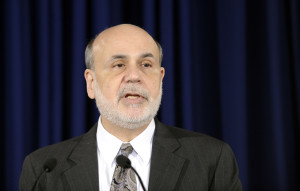Bernanke says sequestration hurt U.S. economy, federal agency missions
The sequestration cuts that began in 2013 weren't just detrimental to federal agency missions, they harmed the economy to boot, said Ben Bernanke, the former...
The autopilot spending cuts that hit the federal government in 2013 weren’t just detrimental to federal agency missions – they also harmed the U.S. economy, Ben Bernanke, the former chairman of the Federal Reserve said Monday. He said even though budget deficits pose a longer-term economic problem, short-term federal spending cuts aren’t the answer.
Bernanke, who served as chairman during the “Great Recession” and through the early days of the recovery at a period when the Fed was trying to keep the economy afloat and return it to growth, said that while sequestration was a relatively small contributor to the overall problem, it certainly didn’t help matters. The automatic cuts the White House and Congress set up for 2013, combined with earlier drawdowns in Defense spending, slowed GDP growth by three-to-four tenths of a percent all on their own, he said.

“That’s not enormous, but it’s noticeable,” he told a Brookings Institution forum on the relationship between Defense spending and the economy. “Part of it was understandable because of the drawdown from the wars in Afghanistan and Iraq, but part of it was deliberate budget cutting. 2013 was the worst year in terms of adverse effects, and those were self-inflicted wounds. All of these cuts were made for presumably economic reasons, but in fact they went mostly in the wrong direction in the sense that they were a mild negative in an economy that was still trying to recover. Those kinds of cuts are less of a big deal than they used to be because Defense spending is a smaller part of the economy than it used to be, but they were unwise and they were not motivated by actual defense needs.”
Besides their broader economic impact, Bernanke criticized the cuts for the inefficiencies they created within the federal budget itself: Their suddenness caused agencies to cancel programs so that they could save money right away, but in ways that are likely to create longer-term costs.
Both the defense and non-defense discretionary parts of the federal budget have been under a temporary reprieve from the Budget Control Act, which created the spending caps in the first place, for the last two years. But the caps are scheduled to come back into effect on Oct. 1 unless Congress reaches a compromise that would repeal or delay another round of automatic cuts.
Bernanke said he would advise lawmakers – as he also did during the height of the economic crisis – to do everything they can to avoid immediate and arbitrary cuts to discretionary spending, and work instead on medium-to-long-term problems, such as health care, which are largely driving the federal deficit.
“There’s nothing in our deficit prospect that should make us distort our defense planning in the near term,” he said. “We should be making our decisions based on medium-term considerations, based on what makes the most sense in terms of efficiency and achieving our objectives. There’s no reason to be taking draconian steps right now that will have costly implications for our defense posture, just for deficit reasons. The deficit is a longer-run issue, and we should be thinking about it in a long-run context.”
But Bernanke was also careful to point out that he doesn’t believe Defense spending is an unalloyed good in terms of its economic benefits. And from there, things get more complicated.
More spending is not necessarily better, he said, particularly when it comes to personnel. The military is not a driver of economic growth simply because it provides jobs.
“You want to avoid the sort of mindset of a Congressman who wants a base in his district, because yes, the government can create jobs through federal expenditures. But the output of those workers isn’t contributing to standards of living, it’s for other purposes,” he said. “The fact that we have 1.4 million active duty servicemembers is a cost to the economy. Obviously they’re important and I’m not in any way saying there are too many or too few, but their services are being used for defense instead of in the private economy. There may be good reasons for it, but that’s a cost, not a benefit.”
On the other hand, in some areas of the defense budget, there are fairly clear relationships between spending and future economic growth. For example, even though many would argue that DoD is still underinvesting in basic scientific research, it still spends billions of dollars each year on basic research that otherwise would not be conducted because it is not in the interest of any individual firm.
“The studies that have looked at the empirical relationship between research and development spending in the military and R&D spending outside show a positive relationship. Every dollar of extra military R&D not only doesn’t displace private sector R&D, it probably adds 20 or 30 cents of private sector R&D because of things the military has already learned. So I think if you’re going to make a case that U.S. military spending has made a positive impact on economic growth, it would probably be through the R&D linkages and spillovers into the private sector, and I think that argues for more basic research.”
Copyright © 2024 Federal News Network. All rights reserved. This website is not intended for users located within the European Economic Area.
Jared Serbu is deputy editor of Federal News Network and reports on the Defense Department’s contracting, legislative, workforce and IT issues.
Follow @jserbuWFED



